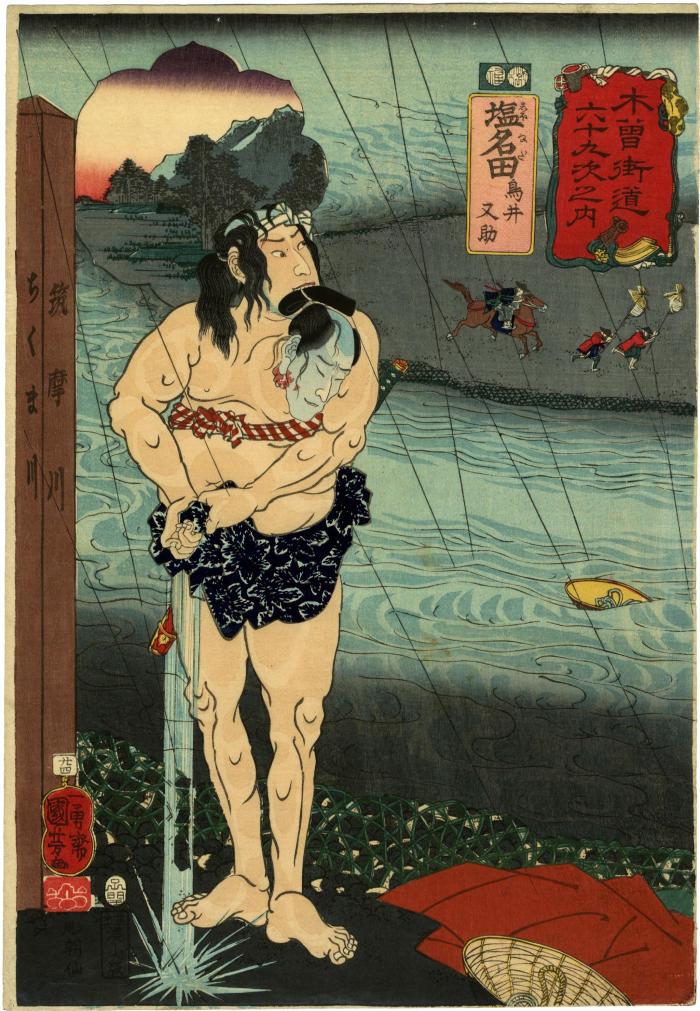Utagawa Kuniyoshi (歌川国芳) (artist 11/15/1797 – 03/05/1861)
No. 24 Shionada (塩名田): Torii Matasuke (鳥井又助), from the series Sixty-nine Stations of the Kisokaidō Road (Kisokaidō rokujūkyū tsugi no uchi - 木曾街道六十九次之内)
02/1852
10.125 in x 14.625 in (Overall dimensions) Japanese woodblock print
Signed: Ichiyūsai Kuniyoshi ga
一勇斎国芳画
Artist's seal: kiri
Publisher: Minatoya Kohei (Marks 332 - seal 22-075)
Carver: Hori Chōsen
Date seal: 1852, 2nd mo.
Censors' seals: Fuku and Muramatsu
Museum of Fine Arts, Boston
Tokyo Metropolitan Library
British Museum
Waseda University
Hiroshige Museum of Art
Musée Cernuschi
Lyon Collection - an 1821 Yoshikuni print of Torii Matasuke
Allen Memorial Art Museum, Oberlin College - mistakenly identified as 'Shoinada' "First produced in Kyoto in 1780, the kabuki play Stories Heard in the Pleasure Quarter at Mirror Mountain (Kagamiyama sato no kikigaki) was loosely based on a power struggle that had taken place some thirty years earlier in the Kaga domain, the hereditary fief of the Maeda family, when an ambitious retainer killed Lord Maeda Yoshitoku and his three sons to further his own schemes. As usual in kabuki plays, the names and setting are changed , so that the plot deals with the troubles of the 'Yasuda' family of 'Taga': but the real basis of the story, the Kaga incident, is concealed in the place-name Mirror Mountain (Kagamiyama), which also features in the titles of other plays on the subject.
In the plays, Torii Matasuke is a loyal retainer of Lord Yasuda of Taga, but he is tricked by the evil Mochizuki Genzō (based on the real-life villain Ōtsuki Denzō). In a rainstorm, the lord is crossing the Chikuma River on horseback when Matasuke, swimming underwater, surprises him and cuts off his head. Clutching his gory trophy in his teeth, Matasuke wrings out his soaked clothing as the lord's retainers dash about in confusion on the far shore. Only too late does he learn that he has killed the wrong person, not the villain he thought he was attacking but his own lord.
Stirrups and other horse trappings frame the series title border. The eight-petaled floral medallion that outlines the inset landscape is a shape sometimes used for bronze mirrors and so may allude to the place-name, 'Mirror Mountain' in the plays. The Chikuma River, clearly identified by the signpost at the left, is a real river that runs near Shinoda station, although it is spelled with different characters in the play."
Illustrated and quoted from: Utagawa Kuniyoshi: The Sixty-nine Stations of the Kisokaidō by Sarah E. Thompson, Pomegranate Communications, Inc., 2009, pp. 64-65, no. 24.
****
Here is the description of Shionada from Hiroshige.org:
Shionata, on the eastern shore of the Chikuma River, was the only stage in the province of Shinshu where travellers often met with interruptions of ferry service. The river ran broad here, and travellers had to be ferried across it. A beauty spot here was the Fudo Fall with abundant clear water, where worn-out travellers had a moment of relaxation.****
There is another copy of this print in the Rijksmuseum voor Volkenkunde, Leiden.
****
Illustrated:
1). Listed, but unillustrated, in Japanese Woodblock Prints: A Catalogue of the Mary A. Ainsworth Collection, by Roger Keyes, p. 191, #511. However, this print is illustrated in black and white on page 105, #176.
2) in Utagawa Kuniyoshi: The Sixty-nine Stations of the Kisokaidō by Sarah E. Thompson, Pomegranate Communications, Inc., 2009, pp. 64-65, no. 24.
landscape prints (fūkeiga 風景画) (genre)
Minatoya Kohei (湊屋小兵衛) (publisher)
Keisei Kagamiyama (けいせい双鏡山) (kabuki)
